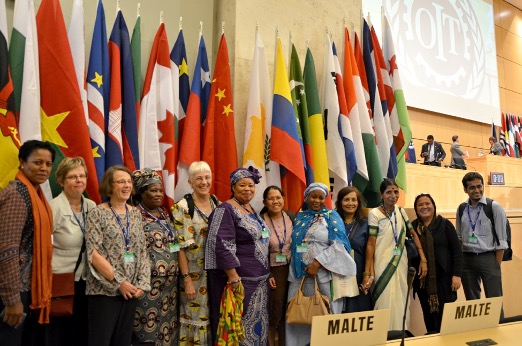Decent Work and the Social and Solidarity Economy
-
May 27, 2022 - June 11, 2022
-
ILO Headquarters, Geneva
Virtual

In June 2022, the 110th Session of the International Labour Conference (ILC) is being held in a hybrid format due to COVID-19 restrictions. During the round of negotiations in June, a general discussion on Decent Work and the Social and Solidarity Economy will take place with the intention of agreeing on a common definition.
During the ILC two-week sessions, a delegation of workers representing the Global Alliance of Waste Pickers, the International Domestic Workers Federation (IDWF), HomeNet International, Self-Employed Women Association of India (SEWA), StreetNet International, and WIEGO will participate in the virtual meetings to bring the voices and experiences of the most marginalized workers to demand principles and practices that respond to their particular needs and demands.
Together, organizations of workers in informal employment across the world are committed to making decent work a reality for ALL workers. There is a need to recognize alternative models of work and production, equitable and redistributive, that recognize and value all forms of work – including informal work. Experience has shown that bottom-up models – such as cooperatives, mutual societies, and associations in the social solidarity economy – contribute to reducing inequality.
The transformation required to achieve such a model is overdue.
This year’s general discussion at the 110th International Labour Conference on Decent Work and the Social and Solidarity Economy should build on the principles for an inclusive definition that recognizes the crucial role of workers in informal employment, with an emphasis on supporting diverse social and solidarity economy models as key drivers of economic and social development.
The international networks of workers in the informal economy and WIEGO welcome the ILO Report on Decent Work and the Social and Solidarity Economy (SSE) prepared for the ILO’s 110th Session and believe that the conclusions of the general discussion on the SSE must be built on the foundation of international instruments referring to SSE units and the ILO decent work agenda. A definition that ensures the application of rights in the field of work and that distinguishes SSE units from other economic activities is essential. We call for the promotion of a distinct identity for the SSE that differentiates it from both the public and private sectors.
Referencing ILO Recommendations 193 (on cooperatives) and 204 (which contains provisions that provide an agenda for action) is important with a view to transitioning from the informal to the formal economy and thus having access to comprehensive labour and social rights. The ILO Office should further strengthen the partnership with representative organizations of workers in the informal economy, including SSE units, to optimize the lessons from the experience of cooperatives appropriately.
Sonia George, General Secretary of Self Employed Women’s Association (SEWA), Kerala during General Discussion Committee on proposed resolution and conclusions concerning Decent work and the social and solidarity economy
The #ILC2020 will discuss a proposed definition of the social and solidarity economy taking into account its values, principles and organizational forms.
Sonia George, General Secretary of Self Employed Women’s Association (SEWA), tells us her expectations for the discussions. pic.twitter.com/lcbDFeklIm
— International Labour Organization (@ilo) May 31, 2022
Representatives of the International Domestic Workers Federation have been following the conversation on Securing decent work for nursing personnel and domestic workers as the third item on the ILC Agenda. This is the first occasion on which Convention No. 189 and Recommendation No. 201 on decent work for domestic workers and Convention 149 and Recommendation 157 on nursing personnel have been the subject of an ILO General Survey.
Read the Committee of Experts on the application of Conventions and Recommendations